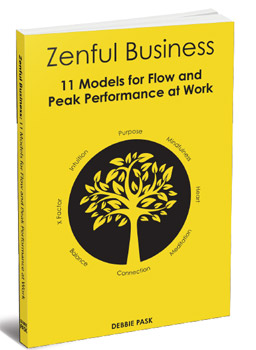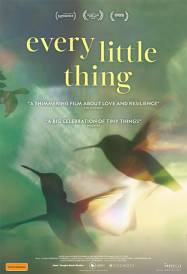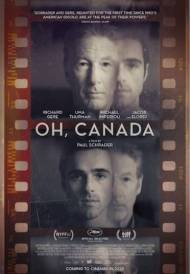Zenful Business: 11 Models for Flow and Peak Performance at Work

Zenful Business: 11 Models for Flow and Peak Performance at Work
In her new book, Zenful Business: 11 Models for Flow and Peak Performance at Work, Debbie Pask introduces 11 do-it-yourself models to teach readers how to thrive in a work environment.
The models are based on personal mastery, which Pask says will help with sales, relationship management, planning, problem solving and commercial leverage.
'Stress and competition is driving serious burnout and health related issues. Plus – there is a level of disconnection from nature and our inner self with the level of communications and technology we are all bingeing on," Pask explains.
'It seems our working life and personal life has become separate and disconnected. Zenful Business tackles these issues and suggests a new and equally (if not more) successful way of combating these problems and working more effectively."
Pask explains that while many books discuss the concepts and theories behind modern ennui, few sources teach readers how to take action or make changes to affect their work lives.
Zenful Business provides readers with do-it-yourself steps they can implement in their pursuit for greater success.
Debbie Pask is a business coach specialising in mindfulness, purpose and value. Debbie is a qualified Meditation teacher and facilitator, Reiki Master and Level 4 teacher, and has a background in board level advertising, a degree in philosophy and has been trained in eastern philosophy, meditation and mindfulness. After leaving her board role in 2003, Debbie built and sold two companies (a boutique consulting firm and an online tools website) and is now the Co-Founder and owner of Zenful Business (business coaching) and Rezinate Pty Ltd (personal coaching). Debbie now spends her time coaching, teaching and writing books to inspire a more connected and conscious approach to doing business – on a commercial and personal level to create a sustainable working life.
Zenful Business: 11 Models for Flow and Peak Performance at Work
Balboa Press Australia
Author: Debbie Pask
RRP: $28.99
Interview with Debbie Pask
Question: What inspired you to write Zenful Business: 11 Models for Flow and Peak Performance at Work?
Debbie Pask: There are so many books published about left brain business strategies and ideas. These are wonderful and logical resources, but I felt there was a gap in the market around being able to harness your own personal energy and flow to supercharge your career or business. We are only now beginning to understand the power of a heart-cantered approach to business and the impacts of energy within our body and working life. I wanted to bridge this metaphysical understanding of energy with the commercial intelligence of business; to show everyone how much more powerful we can be if we align left and right brain – logic and intuition – heart and mind.
Debbie Pask: Most people understand mindfulness as being able to focus in the present – not looking to the past with judgement or to the future with worry. That is accurate, but I like to take it a step further and see it in terms of yin (inward thinking and intuition) and Yang (outward acting and logic). In business, Yang tasks are very much about being busy, returning calls, ticking off lists and logical based linear actions. Yin tasks are more about creativity, strategic visions and thoughtful problem solving. To achieve a state of yin flow, we need the skill of mindfulness so that we can slow down long enough to tap into that beautiful, intuitive mind that we can all access. I also call this our X Factor. It is truly brilliant once switched on.
Question: How does stress relate to poor work?
Debbie Pask: Stress is the enemy of mindfulness and focus. We are either stressing about past failures (that is judgement) or stressing about future plans (that is a control issue). There are two general stresses as I see it. Mental stress, which creates a psychological dis-ease, and physical stress, which creates physical, dis-eases in our body. To be performing at work to the best we can be, we need psychological wellness to access our creative and problem-solving brain and physical wellness to feed the electricity flow of our body so we can operate daily. Poor work can range from being unable to get out of bed in time for work, fighting with colleagues, unable to solve problems due to brain fog and productivity lag which stems from being burnt out and tired by stress so that tasks take twice as long as they should. Stress can create subtle work issues or obvious ones. The subtle ones are harder to see sometimes. Our number one priority is harnessing our energy so that we can keep a healthy mind and healthy body.
Question: How does responsibility kill creativity?
Debbie Pask: Responsibility means to -respond with ability' – which in essence requires us to search our logical and linear brain for the answer, solution or approach. However, many AMAZING ideas do not stem from the rational brain. Einstein himself said, 'I never came upon any of my discoveries through the process of rational thinking." The computer chip (called a brain) inside our head is only programmed to know what we have already learned, so how can it possibly extend itself to new creative ideas and applications that require our intuitive thought.
Creativity uses the intuitive (not-logical) brain function that I refer to as the -yin' principle. Yin is internal, reflective, intuitive and multi-dimensional. It has no limitations. Yin is imagination, and imagination is expansive and limitless. Yang, on the other hand, is logical, responsible and active. We, therefore, need to use Yin thinking for creative tasks within business and Yang thinking for logical or responsive tasks in business.
Yin business tasks include vision setting, strategic plans, new product development, deep listening and solving complex business problems, marketing ideas and more. Yang business tasks are rolling out project plans, setting up processes, making calls, system implementation, emails and meetings.
Question: Can you provide us with your top tips for peak performance at work?
Debbie Pask: Here's my top 3;
1. Master your X Factor – that is the intuitive part of you that houses your natural gifts and talents. These talents are not learned, but rather they are unique to you. Learning to tune in to your inner guidance and higher self means that you can pull magic out of the void and come up with ideas and plans that you never thought possible.
2. Work hard then rest hard. We need to oscillate between high performance or busy periods with recovery and rejuvenation. Learning to read your own energy levels and taking breaks when you have pushed hard is the key to mastering your best flow state at work. Discover what rejuvenation means to you. Some people love to surf or be in the water. Others need a comedy show. My rejuvenation is being in nature, going for a horse ride, getting my feet rubbed and sitting in the sunshine with great coffee. Know what truly makes you feel rested and plan these activities into your life regularly.
3. Surround yourself with soul colleagues. These people resonate naturally with you and give you an energising and uplifted feeling. You need peers in your industry that understand you, other friends in business who you can share stories with, lunch buddies, a mentor or coach you call upon in times of need and possibly paid support people to make your working life easier. Make contact with these people regularly as they will change your life.
Question: Who did you write this book for?
Debbie Pask: The rational and logical answer is to quote you the demographic and target market of potential readers – and that is 30 to 55-year-old men and women in business who are ambitious and seeking a new and next level of success in their working life, without compromising connection and balance at work. Everyone is seeking ways to reduce stress.
The real answer is that anyone from 18 onwards (I recently coached a 16-year-old girl around her life purpose, and she got it pretty quickly) who are open minded could read this book and take a deep message away about how to tackle their working life. I take the principles of energy, mindfulness and flow and inject them into the business world so people can practically apply these ideas at work and in life.
Interview by Brooke Hunter
MORE



